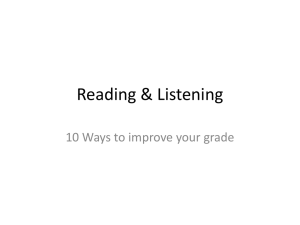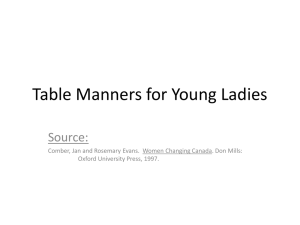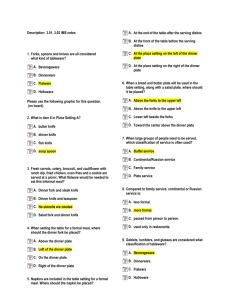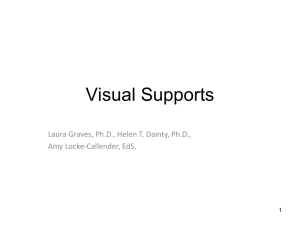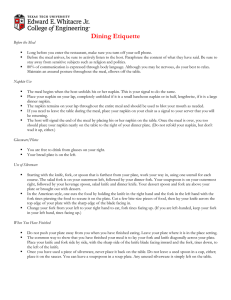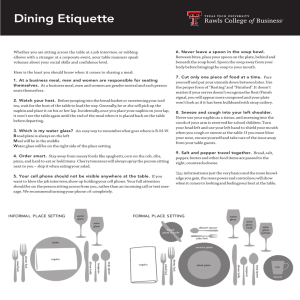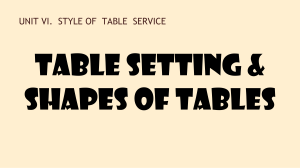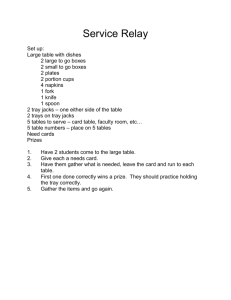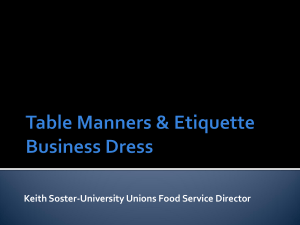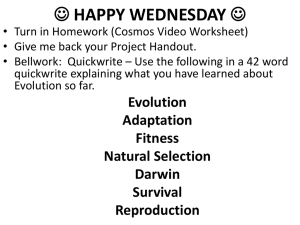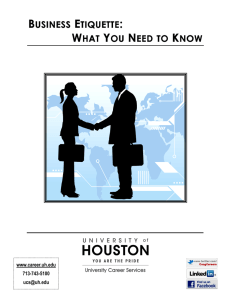Don*t put your elbows on the table!!!!!
advertisement
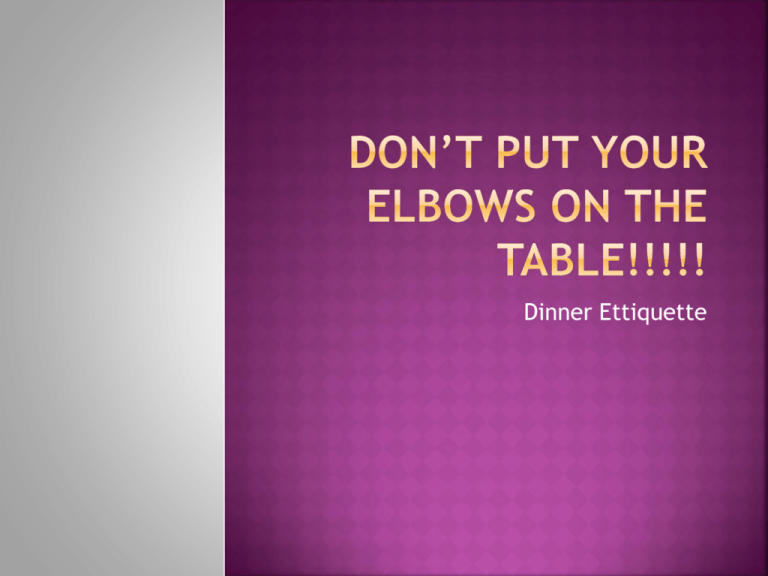
Dinner Ettiquette Once used, your utensils, including the handles, must not touch the table again. Always rest forks, knives, and spoons on the side of your plate or in the bowl. Keep elbows off the table. Keep your left hand in your lap unless you are using it Do not talk with your mouth full. Chew with your mouth closed. Loud eating noises such as slurping and burping are very impolite. The number one sin of dinner table etiquette! Pass food from the left to the right. Do not stretch across the table, crossing other guests, to reach food or condiments. Set any passed item, whether it's the salt and pepper shakers, a bread basket, or a butter plate, directly on the table instead of passing hand-to-hand. Serving food: Food is served from the left. Dishes are removed from the right. Always say please when asking for something. At a restaurant, be sure to say thank you to your server and bus boy after they have removed any used items. Turn off your cell phone or switch it to silent or vibrate mode before sitting down to eat, and leave it in your pocket or purse. It is impolite to answer a phone during dinner. If you must make or take a call, excuse yourself from the table and step outside of the restaurant. Unfold your napkin and place it on your lap. When you are finished, place it loosely on the table, not on the plate and never on your chair. American Style: Knife in right hand, fork in left hand holding food. After a few bite-sized pieces of food are cut, place knife on edge of plate with blades facing in. Eat food by switching fork to right hand (unless you are left handed). A left hand, arm or elbow on the table is bad manners. Always scoop food, using the proper utensil, away from you. Cut only enough food for the next mouthful (cut no more than two bites of food at a time). Eat in small bites and slowly. Don't blow on your food to cool it off. If it is too hot to eat, take the hint and wait until it cools. Never intercept a pass. Snagging a roll out of the breadbasket or taking a shake of salt when it is en route to someone else is a nono. Always use serving utensils to serve yourself, not your personal silverware. Try to pace your eating so that you don’t finish before others are halfway through. If you are a slow eater, try to speed up a bit on this occasion so you don’t hold everyone up. Never continue to eat long after others have stopped Say "Excuse me," or "I'll be right back," before leaving the table. Do not say that you are going to the restroom. Whenever a woman leaves the table or returns to sit, all men seated with her should stand up. Do not blow your nose at the dinner table. Excuse yourself to visit the restroom. Wash your hands before returning to the dining room. If you cough, cover your mouth with your napkin to stop the spread of germs and muffle the noise. If your cough becomes unmanageable, excuse yourself to visit the restroom. Wash your hands before returning to the dining room. Do not push your dishes away from you or stack them for the waiter when you are finished. Leave plates and glasses where they are. Do not use a toothpick or apply makeup at the table. Use the silverware farthest from your plate first. Here's the Silverware and dinnerware rule: Eat to your left, drink to your right. Any food dish to the left is yours, and any glass to the right is yours. Starting with the knife, fork, or spoon that is farthest from your plate, work your way in, using one utensil for each course. The salad fork is on your outermost left, followed by your dinner fork. Your soup spoon is on your outermost right, followed by your beverage spoon, salad knife and dinner knife. Your dessert spoon and fork are above your plate or brought out with dessert. If you remember the rule to work from the outside in, you'll be fine. http://youtu.be/unXKYK0uRJ8 http://youtu.be/81NbVQVi5SY
